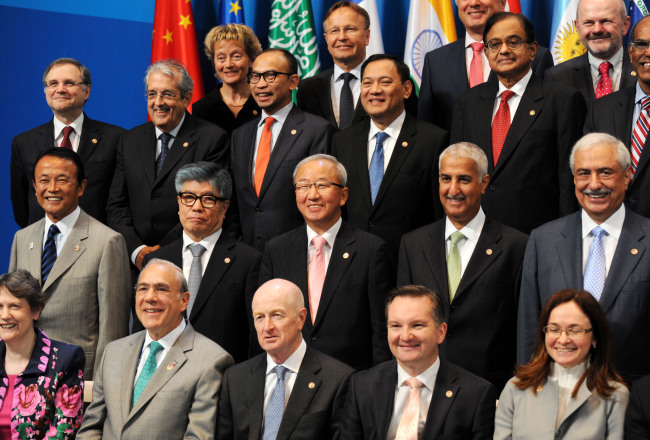Seoul and Washington are poised to speed up their negotiations on sharing information on wealthy citizens’ bank accounts held overseas.
According to a key agreement reported to have been reached as part of the coming bilateral pact, Korea’s financial firms could be obliged to notify the U.S. tax authorities of the deposit balance held by U.S. citizens and vice-versa.
During their talks on the sidelines of the Group of 20 finance ministers’ meeting in Moscow over the weekend, Deputy Prime Minister and Finance Minister Hyun Oh-seok reportedly shared the view of U.S. Treasury Secretary Jacob Lew on the importance of cracking down on offshore tax evasion, according to officials at the Finance Ministry.
 |
Deputy Prime Minister and Finance Minister Hyun Oh-seok (third from left, second row) and Bank of Korea Governor Kim Choong-soo (second from left, second row) pose during the gathering of economic and monetary policymakers from the G20 members in Moscow over the weekend. (Ministry of Strategy and Finance) |
“There has been progress in their bilateral talks to implement the U.S. Foreign Account Tax Compliance Act,” said the ministry in a statement on Sunday.
The FATCA requires financial firms worldwide, including those in Korea, to report to the Internal Revenue Service about American customers whose deposits exceed $50,000 (57.5 million won) or more.
Meanwhile, Hyun informed Lew of the situation that Korean exporters are undergoing critical losses from the U.S. government’s new sanctions against Iran.
Washington-led enhanced military and administrative sanctions against the country took effect on July 1.
Expressing concern about the trade situation with Iran, Seoul earlier said in a statement that “some 2,300 small and mid-sized enterprises are likely to severely be hit by the U.S. action.”
Further, about 530 out of the 2,300 SMEs are posting more than a 50 percent ratio of exports to total sales, according to a joint statement from the Finance Ministry, Foreign Affairs Ministry, Trade Ministry and Oceans Ministry.
“Irrespective of trading amount, Korean firms will be sanctioned when they export products from sectors including energy, shipbuilding, shipping, harbor facilities and steel,” the ministries said.
By Kim Yon-se (
kys@heraldcorp.com)








